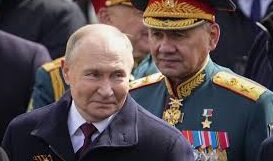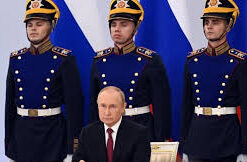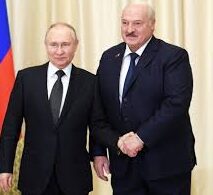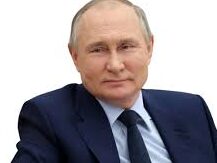
Russian President Vladimir Putin made significant changes to his Cabinet on Sunday, including replacing Sergei Shoigu as defense minister. This move comes as Putin embarks on his fifth term in office.
Following Putin’s lavish inauguration at the Kremlin, Russian law required the entire Cabinet to resign, which they did on Tuesday. While most members were expected to retain their positions, there was uncertainty surrounding Shoigu’s fate.
Putin’s decree on Sunday appointed Shoigu as secretary of Russia’s Security Council. Shortly after, Putin proposed Andrei Belousov to take over as defense minister, replacing Shoigu.
The news of Shoigu’s new appointment coincided with reports of a tragic incident in Belgorod, a city on Russia’s border, where a residential building partially collapsed following what Russian officials claimed was shelling from Ukraine. Thirteen people were reported dead, and another 20 were wounded in the incident.
Belousov’s nomination for defense minister will need to be ratified by Russia’s upper house of parliament, the Federation Council. The Council confirmed on Sunday that Putin had submitted proposals for various Cabinet positions, with Shoigu being the only minister slated for replacement. Prime Minister Mikhail Mishustin, who was reappointed by Putin on Friday, had introduced several other new candidates for federal ministerial positions on Saturday.
The arrest of Shoigu’s deputy, Timur Ivanov, on bribery charges last month and his subsequent detention pending investigation was widely seen as a move against Shoigu himself, given their close relationship with Putin.
Kremlin spokesman Dmitry Peskov stated on Sunday that Putin’s decision to appoint a civilian as defense minister was aimed at fostering innovation and modernization within the ministry. Peskov also emphasized the need for the defense budget to align with the broader economy, suggesting that Belousov’s background as the former first deputy prime minister makes him suitable for the role.
Belousov, aged 65, has held prominent roles in finance and economics within the prime minister’s office and the Ministry of Economic Development. He began his tenure as an adviser to Putin in 2013 and was elevated to the position of first deputy prime minister in January 2020.
Peskov emphasized that the Cabinet reshuffle would not impact “the military aspect,” which has historically fallen under the purview of the Chief of General Staff. General Valery Gerasimov, who currently holds this position, will continue his duties uninterrupted.
Tatiana Stanovaya, a senior fellow at the Carnegie Russia Eurasia Center, commented online that Shoigu’s new role in Russia’s Security Council indicates Putin’s perception of the institution as a repository for his “former” key figures — individuals whom he cannot afford to dismiss entirely but for whom he currently lacks a suitable position.
Other prominent figures, such as former Russian President Dmitry Medvedev, have also been assigned roles within the Security Council. Medvedev has served as the council’s deputy chairman since 2020.
Shoigu’s appointment to the Security Council occurred in lieu of Nikolai Patrushev, a long-term ally of Putin. Peskov announced on Sunday that Patrushev would be assuming another position, with further details to be disclosed in the coming days. Vladimir Putin
Shoigu has often been regarded as a central figure in Putin’s decision-making process, particularly concerning the deployment of Russian troops into Ukraine. Russia had anticipated that the military operation would swiftly overpower Ukraine’s smaller and less-equipped army, with widespread support from the Ukrainian population for Russian intervention.
Instead, the conflict in Ukraine prompted a resilient response from the Ukrainian forces, inflicting significant setbacks on the Russian army. These included the retreat from an attempted seizure of the capital, Kyiv, and a successful counteroffensive that forced Moscow’s troops out of the Kharkiv region.
Before assuming the role of defense minister in 2012, Shoigu had a diverse career spanning over 20 years. In 1991, he was appointed as the head of the Russian Rescue Corps, an agency responsible for disaster response, which later evolved into the Ministry of Emergency Situations. Shoigu gained considerable visibility in this role. Additionally, his tenure in the agency allowed him to attain the rank of general, despite lacking prior military service, as the rescue corps integrated the militarized Civil Defense Troops. Vladimir Putin
Shoigu may not hold the same level of authority as Patrushev, who has been a prominent figure in Russia’s security apparatus for a long time. However, the role he is assuming—the same one that Patrushev elevated from a minor bureaucratic position to one of significant influence—will still carry considerable weight, according to Mark Galeotti, the head of the Mayak Intelligence consultancy.
Even with changes in leadership, high-level security documents intended for the president’s review will continue to flow through the Security Council Secretariat. “You can’t simply overhaul the workings of a bureaucracy and its processes overnight,” Galeotti noted. Vladimir Putin
Thousands of civilians have fled as Russia resumes its ground offensive in northeastern Ukraine, bombarding towns and villages with artillery and mortar shelling, officials reported Sunday.
The intense fighting has compelled at least one Ukrainian military unit to retreat in the Kharkiv region, conceding more territory to Russian forces across sparsely defended settlements in the contested gray zone along the Russian border. Vladimir Putin
By Sunday afternoon, the town of Vovchansk, one of the largest in the northeast with a prewar population of 17,000, became a focal point in the battle.
Volodymyr Tymoshko, the head of the Kharkiv regional police, reported that Russian forces were on the outskirts of the town, advancing from three directions. Vladimir Putin
An Associated Press team, stationed in a nearby village, observed plumes of smoke billowing from the town as Russian forces launched shells. Evacuation teams tirelessly worked throughout the day to remove residents, many of whom were elderly, from the danger zone.
At least 4,000 civilians have fled the Kharkiv region since Friday, when Moscow’s forces initiated the operation, according to Governor Oleh Syniehubov’s social media statement. Heavy fighting persisted Sunday along the northeast front line, with Russian forces targeting 27 settlements in the past 24 hours, he reported. Vladimir Putin
Analysts suggest that the Russian offensive aims to exploit ammunition shortages before anticipated Western supplies can arrive at the front line.
Ukrainian soldiers allege that the Kremlin is employing its typical tactic of launching a disproportionate amount of artillery fire and infantry assaults to deplete Ukrainian troops and resources. By escalating conflicts in previously static areas of the front line, Russian forces risk entrenching Ukrainian forces in the northeast while simultaneously engaging in intense battles further south, where Moscow is also making advances. Vladimir Putin
The increased attacks in March targeting energy infrastructure and settlements were seen as a deliberate effort to create conditions conducive to an offensive, according to analysts.
In a separate incident, a 10-story apartment building partially collapsed in Belgorod near the border, resulting in at least 13 fatalities and 20 injuries. Russian authorities attributed the collapse to Ukrainian shelling, although Ukraine has not responded to these allegations. Vladimir Putin
The Russian Defense Ministry announced on Sunday that its forces had seized control of four villages along the border in Ukraine’s Kharkiv region, in addition to five villages captured on Saturday. These areas were likely vulnerable due to ongoing dynamic fighting and heavy shelling, facilitating the Russian advance. Vladimir Putin








